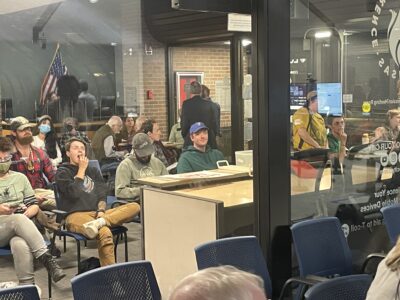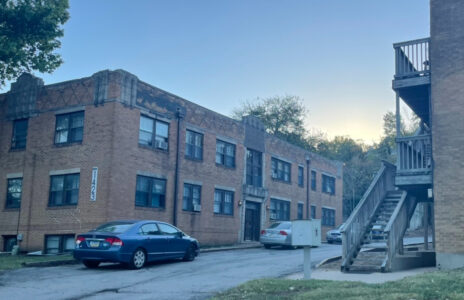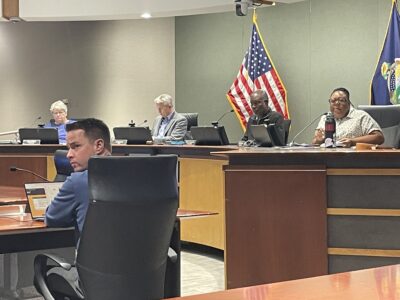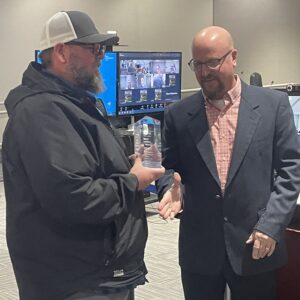Private ambulance services now can apply to operate in Lawrence; new rules apply only to non-emergency calls
Transports to out-of-town hospitals tie up local ambulances for hours

photo by: Chris Conde/Journal-World
A Lawrence Douglas County Fire Medical ambulance is pictured in July 2023.
The City of Lawrence has approved a change in city code to allow private ambulance companies to perform non-emergency medical transports to and from the hospital to alleviate some of the burden on Lawrence-Douglas County Fire Medical crews.
But don’t worry, LDCFM will still be rushing to the rescue for 911 emergency calls, said John Darling, Division Chief of EMS at LDCFM.
“LDCFM has performed around 750 non-emergency transfers per year in recent years. While many of these transfers are to local destinations, a significant portion are to out-of-town hospitals, which can take one of our ambulances three hours or more before they are available for other emergency responses,” Darling said.
That conflict of non-emergency calls to emergency calls happened during a string of calls including a residential fire on Sunday, as the Journal-World reported.
An ambulance had just left the city to transport a patient who was in emergency when at the same time a non-emergency transport was requested by another patient. All the while, LDCFM was working to ensure the rest of the city was covered in case of any new emergencies that might arise, Darling said.
“The intent of this change is to keep LDCFM ambulances available for emergency incidents,” Darling said.
The City of Lawrence first approved the measure for private ambulances to respond to non-emergency transports in May after a similar measure was approved by the Douglas County Commission in January. The final language change to the city code was approved by the City Commission Tuesday night.
LDCFM has been dealing with a significant increase in calls over the last two decades from about 9,000 in 2005 to 18,000 in 2024, Darling said. With the increase in call volume, LDCFM has only added one ambulance from 6 in 2005 to 7 in 2024. He said even by eliminating some of the non-emergency transports, there will still be plenty of work to do.
LDCFM will still be responsible for the 250 to 300 annual emergency transports from one hospital to another.
“These are time-critical transfers from one hospital to another hospital when a delay could reasonably be expected to negatively impact the patient’s condition,” Darling said.
The new policy gives the city and county the power to license third-party ambulance services that meet the city and county’s standards to work locally. Those licenses would last five years, Darling said. The city would also set a fee schedule for those ambulance services.
The new policy won’t directly cost the city or county anything but would ultimately reduce the amount of revenue that the ambulance service generates for the local governments, Darling said.
Darling said that the hope is a non-emergency ambulance service will choose to base its operations in Lawrence. But the code doesn’t require such companies to have a local presence. Instead, providers in other communities could choose to expand their territories into Lawrence and Douglas County.
“The code does not require services to be based in Lawrence,” Darling said. “One or more services may find it advantageous to base some or all of their operations in our community, and we would welcome economic development and investment in our community.”
There are several non-emergency medical transport services in neighboring communities, including Fireman Transport and Express Medical Transportation, both out of Kansas City. There is also an option from Uber that doctors can use to arrange patient transports, according to Uber’s website. It is unclear which companies will choose to apply for an operating license and expand into Douglas County.
But ultimately, the community’s public safety leaders are expecting new companies to begin serving the area, which should mean Lawrence-Douglas County Fire Medical will be in a better position to serve the community too, Darling said.
“These programs help make Lawrence a safer and healthier community and allow us to ensure vital assets such as fire trucks and ambulances remain available for responding to emergency incidents,” Darling said.







